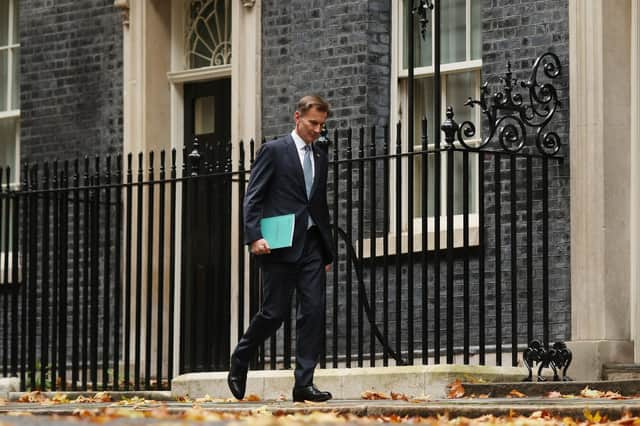Autumn statement: Jeremy Hunt puts out fires but Brexit is still burning a hole in UK economy – Scotsman comment


Yesterday Hunt completed his damping down process to restore a fair amount of the lost confidence among financiers, one of whom quipped that he had “managed to make markets boring again”.
Given the circumstances, the measures he announced represented, for the most part, a pragmatic approach to UK plc’s plight. His decisions that the wealthiest should pay a bit more in tax, the windfall tax on energy giants will increase, tax loopholes for international tech corporations should be closed, and the national living wage will go up by 9.7 per cent, to £10.42, are all to be applauded.
Advertisement
Hide AdAdvertisement
Hide AdWe also welcome his efforts to modernise the economy by improving the regulations governing digital technology, life sciences, green industries, financial services and advanced manufacturing, all areas of potential high-value growth.
However, no one should be in any doubt that grim times lie ahead. According to the Office for Budget Responsibility, whose advice was so sorely missed by Truss and co, the UK’s underlying debt is set to hit a 63-year high of 97.6 per cent of GDP in 2025-26. Meanwhile, living standards are expected to fall by seven per cent over the next two years.
And when Hunt spoke of spending increases, for example for the NHS budget, in cash terms, rather than percentages, he may have done so to make the comparison with soaring inflation a little less obvious. There was bleak news among the big numbers.
While it is true that the energy and Covid crises are global and it is nonsense to say all this is entirely Truss’s fault – just as it was to blame Gordon Brown for the international financial crash of 2008 – there is no escaping the fact that previous Conservative governments have added significantly to the economic problems facing the UK today.
The worst mistake was one that both the Tory and Labour parties remain more or less in denial about – Brexit. Hunt used the B word just once – speaking of “using our Brexit freedoms” – but the extent of the damage this has done to our economy is increasingly hard to avoid.
Last month former Bank of England governor Mark Carney, asked about the effects of voting to leave the EU, said: “Put it this way, in 2016 the British economy was 90 per cent the size of Germany’s. Now it is less than 70 per cent.”
The years of austerity after the 2008 crash were not rewarded by anything like an economic boom, and then Britain was hit by three major blows in succession: Brexit, Covid and the energy crisis. This now leaves the UK in a parlous state.
The OBR warned that the near-tripling of interest rates since March meant the share of government revenues required to service its vast debts was rising, “leaving the public finances more vulnerable to future shocks or swings in market sentiment”. And with Vladimir Putin angry and wounded by defeats in Ukraine and tensions rising between China and Taiwan, the next few years could see the UK plagued by yet more economic wildfires beyond its control, along with actual ones caused by climate change.
Advertisement
Hide AdAdvertisement
Hide AdHunt’s statement undid much of the damage caused by Truss. However, the continued failure to acknowledge that Boris Johnson’s hard Brexit was an act of self harm that we must now try to heal is a much bigger problem. A return to the EU anytime soon may be unlikely but there are steps, like joining the European Free Trade Association, that could be considered.
However, politicians across the spectrum still appear unwilling to make this case for fear of Brexiteer wrath. Power too timid to speak truth to “the people” is no way to run a country.
Comments
Want to join the conversation? Please or to comment on this article.